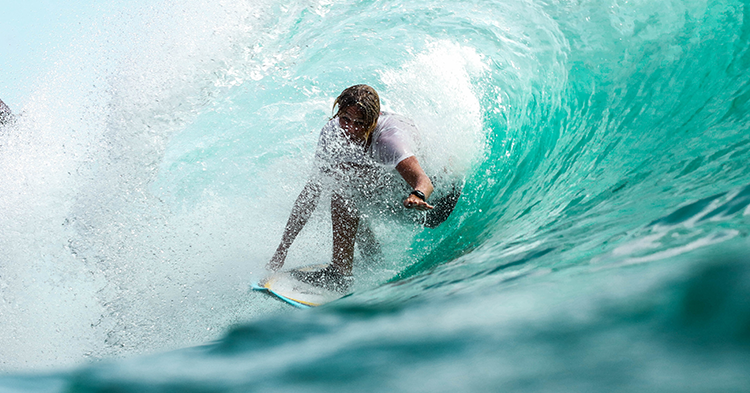Surfing the Unwritten Page: How Writing is Like Surfing
The natural elements have always been a boon for writers. The history of literature is littered with allusions to flowers, mountains, and forests. One inescapable element that is prevalent above all others is the sea. It’s boundless freedom, the shadowy depths from which all life springs have inspired some of the greatest works from Shakespeare’s Tempest to Melville’s Moby Dick.
Our interactions with the sea aren’t limited to gazing into its wondrous deep, and the poetic nature of its waves was harnessed by ancient Polynesians, observed eventually by 18th-century colonialists such as James Cook. Writers such as Mark Twain and Jack London commented on the simple beauty of surfing in their travel journals, and we can consider surfing very much like we consider writing.
Viewing the Expanse
When we approach the sea with a surfboard, we can draw a sharp parallel to a writer approaching the blank page. There they stand, their instruments ready as they observe their goal, waiting for an understanding of what it is they must endeavor to do.
When approaching the blank page, we must first see that the conditions are right, that we will not be swept away or left stranded with no direction to swim in.
Taking the Plunge
In order to surf, one must first get wet. Nerves or worry must pass away and we must be bold in taking that first step into the cool water. So often do we stand upon the shore wondering what must be out there, but we can be stuck there for an age waiting for the right moment.
As with writing, we must take a brave plunge into the flowing and ebbing tide. We may receive the shock of the cold water, and with writing, we may find our first sentence is not what we expected. But once you acclimatize, you’ll find the water is actually quite warm, that you have the freedom to move and, getting on the board, that you can move swiftly against the tide.
Watching the Waves
So much of writing is patience. It is easy to tire of all the waiting for inspiration. We get bored, we move onto other things, unaware that as we looked away a huge wave was right on top of us and we were unable to catch it through distraction.
“While we sit on our boards, pens at the ready, we must be constantly vigilant, constantly aware of the changing sea around us. When that wave comes, we’ll be ready to leap into action, to harness that cascade of inspiration and furiously paddle our way to keep abreast of it,” says Daniel Gonzales, travel writer at UKWritings and OXEssays.
Finding the Breaker
As we watch the sea rising above us, it can be daunting to attempt to harness it. It is tempting to simply duck and continue waiting. There’s a constant fear of failure, that we’ll be taken down, and too often as writers we’ll find a way to procrastinate and put off channeling the inspiration into something productive.
A surfer who cannot paddle will never find the bliss of surfing. Therefore it is important that we work hard, striving to keep that wave of inspiration behind us, pushing us forward until we have it under our boards. Writing is hard work at times, and we must push through the choking points in order to find ourselves in motion.
Wiping Out
Sometimes we find that we may have taken on a wave larger than we can handle. It can be a real test of our strength of character to find this out, and too often do we grab our boards and head back to the shore, turning our back on the sea.
“For the writer, after you’ve put so much hard work into a piece of writing and finding out it is less than what we hoped, it can be a soul-crushing experience, and many will never return. But that is why it so important that we get back on the board as soon as our waves have wiped us out. The longer you let the sea beat you, the easier it becomes to push back,” shares Gregory Jackson, blogger and author at Simple Grad and Australian Reviewer.
The Ride
The truth of the matter is that there is no final goal, no destination when you’re on the board. There is a thrill to finding the wave and flying along with it. If you’re lucky enough, you’ll get caught in the pipeline, watching the world through a lens that only comes but once.
It’s no good taking up writing in order to achieve fame, fortune or stability. It is none of these things, and those who achieve them only do so through luck. Therefore, you have to enjoy it as you write. Enjoy the words you think of, enjoy the sentences you construct. If you focus on the shore, you will miss the best part of writing—the ride.
Read these posts.
Writing Process Explained for Non-Writers
How to Create an Interactive Ebook: A Step-by-Step Guide
How to Optimize Videos and Add Them to Your Ebook













olive
November 2, 2019spreading post I should thank you for the undertakings you have made recorded as a printed copy this intersting and made article.spss help
Neha Lakhani
November 6, 2019Excellent information you have shared, thanks for taking the time to share with us such a great post. spss help
Sherry Jennings
March 19, 2025Such a creative analogy! Writing, like surfing, requires flow and balance. With AI development, you can refine your writing process, analyze your style, and surf through ideas more smoothly, creating compelling content every time.